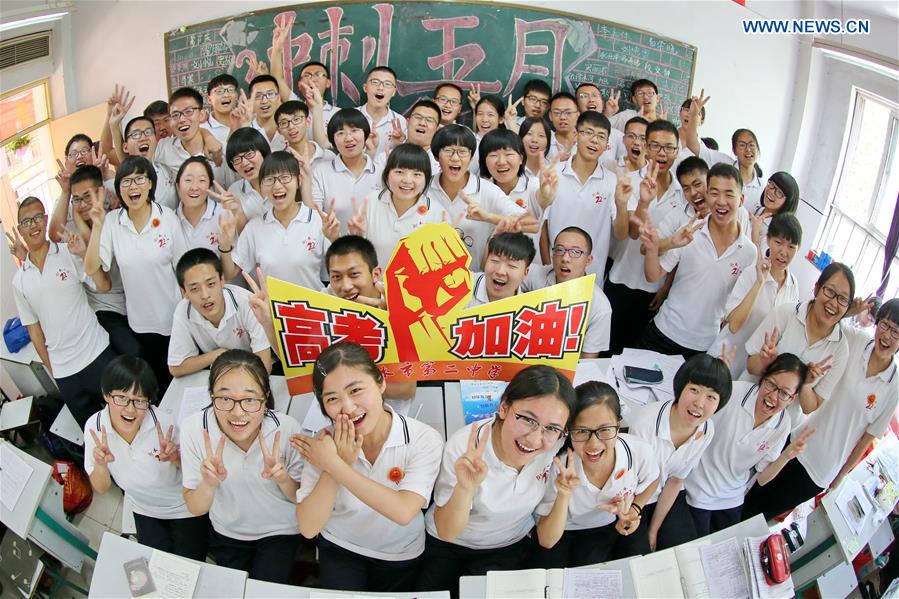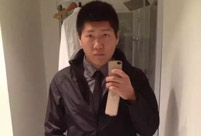

Even more students than last year can opt out the annual gaokao this year, as it approaches next week. In recent years, an increasing number of parents sent their children to overseas schools. Even though there's increasing amount of negative news about this group, the parents think this is the best option for their children, especially compared to what they can get at home.

Senior high students pose for photos as attending an activity for relaxation in No. 2 High School of Hengshui, north China's Hebei Province, May 24, 2016. Students preparing for 2016 college entrance exam have entered the sprint stage of their review. (Xinhua/Zhu Xudong)
When Hu Enrui was a sophomore in middle school, he made a pact with his father Hu Ming that if he could get into the best high school in Lianyungang, East China's Jiangsu Province, his father will send him to a university in the US after he graduated.
Hu Ming was surprised when his son said he wanted to study abroad. Lianyungang is a third-tier city and doesn't have as many resources as Beijing or Shanghai, but Hu Enrui said he learned about the US from American films and admired the country.
Since then, Hu Ming started saving up. He had worked at a bank in the earlier years and then started his own business.
"Money is not an issue. We can afford to send him abroad," he said. "The important thing is he receives a better education and has more opportunities."
The annual two-day gaokao (college entrance exam) takes place across China next week. Hundreds of thousands of students sit through the tests that could greatly impact their lives.
But many, like Hu Enrui, already know their fate before June.
Nowadays, it's not uncommon for Chinese parents to send their children overseas for college education. The trend has been rising in recent years, amid discussions about the regional inequality of gaokao that has led to mass protests against affirmative action policies.

Angry parents
Hu Ming decided to send his son abroad at a time when discussions about equal access to education in China were becoming more heated.
In the past, parents have always argued that Beijing is in an unfairly advantageous position in terms of access to good education, because the scores required for local Beijing children to get into Beijing universities are lower than those from other provinces. Beijing is targeted also because it has a high concentration of prestigious schools, such as Peking University and Tsinghua University.
As the number of good-quality higher education institutions in China is limited, the college entrance exam essentially decides the fate of many families across the country. It's a fast and relatively fair way for these children to move up the social hierarchy, which is why it's also a high priority for many parents.
Last month, a group of angry parents in Nanjing blocked the road to the provincial government headquarters and demanded justice. The protests came after the Ministry of Education released affirmative action policies that cut Jiangsu and Hebei's college enrollment quota to increase chances of students in poorer, western regions getting into better institutions. After a couple of days, protests also erupted in several cities in Hubei Province.
Following the protests, education authorities have reassured parents that the policy was based on the prerequisite that college admission rates for local students in the regions concerned will not be lower than last year.
Many commented that when it comes to their children's future, Chinese parents are always edgy.
But in reality, most of those who joined the protests are people without a choice, people whose children must take the gaokao to enter a university. The process greatly impacts their children's future. For many others, they have alternative choices, such as sending their children abroad.
Choosing another path
Hu Ming's son was accepted by the University of California this year and will start in September. Hu will willingly pay for his son's tuition, about one million yuan ($152,000), in full.
"People at my age probably have some savings, a couple of apartments, and we are willing to spend a little on our children's education," he said. This applies to many people in the growing middle class in China.
Some parents also choose the path of overseas education for their children simply to avoid the gaokao.
Zhang Zhanhe, a staff at Nanjing Institute of Technology, said being a teacher at a higher education institution, he doesn't have much faith in the quality of Chinese college education. Besides, he doesn't think his daughter can go to a good university in China, because her grades aren't in the top range of the class.
Naturally, sending her abroad became the family's best option.
Because they are unfamiliar with the application process, the family sought help from an agency, which took care of compiling the materials.
During the application process, it became clearer that his daughter better suits a system where evaluation is not solely based on grades. She had organized a number of school activities and served as an English translator on many occasions, all of which strengthened her application.
Supporting an industry
According to a 2015 report by the Organization for Economic Co-operation and Development, China has the biggest number of students who study abroad. The number of students studying abroad stood at 459,800 in 2014, an increase of 11 percent over 2013, the report showed. In the past 10 years, the number has doubled.
The pursuit of overseas education has led to a boom in related consulting agencies. A search on baidu.com turns out many agencies, most of them bragging about how many students they have sent to Ivy League schools.
Foreign language schools are also becoming popular in China.
Yin Qiaochen, a 2006 graduate of the Nanjing Foreign Language School, said that 200 out of about 500 people in his class chose to study abroad.
The high school is one of the best foreign language institutes in East China's Jiangsu Province. There are many such high schools across China with a focus on foreign languages, especially English, providing a better education.
Yin recalls when he was studying in the high school, his classmates started to gradually apply to schools abroad from the second year. He applied for an American college as well and convinced his parents it was the right choice.
The school also provides a favorable atmosphere for students who want to study abroad.
"Every summer, the school organizes overseas trips to help students familiarize with cities and university campuses, mostly in the UK and the US," Yin said.
Another prestigious and popular school in China is the High School Affiliated to Shanghai International Studies University. Sun Yu, a teacher at the university, said about one-third of their graduates apply for foreign universities, one-third are accepted early via recommendation and interview by schools in China and the rest take the gaokao.
"The high school isn't just an incubator for talents to be sent overseas," Sun stressed. "We've sent talented young people to Chinese universities and various departments as well."
But the fact remains that the school excels in providing education on foreign languages and prides itself in producing independent students who are well-conversed in many aspects, not just in academics. Such qualities make the school a natural springboard for those who want to pursue education in a foreign university.
Varying experiences
Teri Bao, a 17-year-old student, went to study at a British private high school after graduating from middle school in China two years ago. Her parents decided it was best for her to pursue her studies overseas because of the better quality of education compared with China.
Bao fully agreed with her parents, saying she had more freedom with her studies in the UK.
"We have field trips in our science class, and in our chemistry class we do all sorts of interesting experiments," she said.
She recalls being forced to take extra lessons in the Chinese middle school. The teacher would even use up the time for gym classes and morning exercises.
But some also experienced disappointment with an overseas education.
Yin said if given a second chance, he would've thought twice about applying to a liberal arts college in the US.
"Back then I chose the school because it had a good reputation and offered me a stipend," he said. "But I didn't pursue a higher degree, and just a bachelor's degree from a college is not enough to find a good job in China."
In recent years, media reported more negative news about the behavior of Chinese students in the US. A couple of students were sentenced for bullying their peers. Some couldn't get accustomed to a foreign society.
Some students feel great pressure. They are not ready language-wise and some aren't independent enough to live in a foreign country by themselves. Some parents even accompany their children abroad, cook for them and clean their apartments.
The US government is also determined to crack down on underground agencies and students that fake their TOEFL scores or resumes to get into American universities.
Despite all the issues, the popularity of overseas education remains high in China.
Like Hu Ming, parents want their children to have more choices than they themselves had. After graduation, the children may choose to work in other countries.
"His mother and I belong to ordinary working class. We want him to see more and experience more," Hu Ming said of his son.
 French girl ties the knot with Chinese boy
French girl ties the knot with Chinese boy Beijing Style: ready for bare legs
Beijing Style: ready for bare legs Century-old station sees railyway evolution
Century-old station sees railyway evolution Enthusiasts perform Kung Fu at Wudang Mountain
Enthusiasts perform Kung Fu at Wudang Mountain Stunning photos of China's fighter jets in drill
Stunning photos of China's fighter jets in drill Monk's mummified body to be made into a gold Buddha statue
Monk's mummified body to be made into a gold Buddha statue Former Chinese solider of the French Foreign Legion seeks wife online
Former Chinese solider of the French Foreign Legion seeks wife online Asia's longest and highest suspension bridge to open to traffic
Asia's longest and highest suspension bridge to open to traffic China's first interactive robot looks like a beauty
China's first interactive robot looks like a beauty Top 20 hottest women in the world in 2014
Top 20 hottest women in the world in 2014 Top 10 hardest languages to learn
Top 10 hardest languages to learn 10 Chinese female stars with most beautiful faces
10 Chinese female stars with most beautiful faces China’s Top 10 Unique Bridges, Highways and Roads
China’s Top 10 Unique Bridges, Highways and Roads Art not porn
Art not porn Congestion fee needs careful deliberation
Congestion fee needs careful deliberation Beijing policemen probed for man’s death
Beijing policemen probed for man’s death Why does China get carte blanche for its insensitivity
Why does China get carte blanche for its insensitivityDay|Week